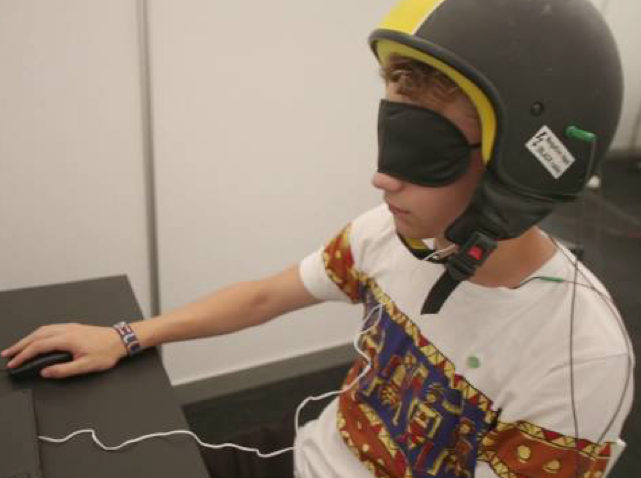
The "God helmet" is an odd-looking psychology tool that can evoke mystical experiences in wearers akin to religious visions—despite being nothing more than an elaborate hat. The helmet is purely a placebo and new research shows that self-proclaimed spiritual people are even more susceptible to fall for its illusion than intoxicated people.
The study published online in Religion, Brain, & Behavior found new information to further back previous evidence that a purely aesthetic hat, referred to as a God helmet, can elicit mysterious experiences. This new study, published in December 2017, builds on past research in that it also tested if alcohol consumption played a role in users' susceptibility to having visions while wearing the God helmet.
"We knew from previous studies that supernatural believers are more prone to placebo brain stimulation-induced mystical experiences than non-believers," lead study researcher David Maij, a researcher at the University of Amsterdam who focuses on brain cognition and psychology told Newsweek. "We wanted to investigate whether intoxication with alcohol, through lowering cognitive control, would increase people's proneness to have extraordinary experiences."
Related: Watching Pornography May Help Relgious Christians Change Their Minds About Abortion
Researchers from the University of Amsterdam had 193 volunteers wear the God helmet for 15 minutes while blindfolded and listening to white noise through earbuds. The volunteers were told that the helmet would electromagnetically stimulate their brains and cause them to have supernatural experiences. However, in reality the helmet did absolutely nothing.
The volunteers were chosen at a three-day music festival in the Netherlands, which gave the researchers a perfect opportunity to explore if alcohol consumption affected God helmet results. The team analyzed the volunteers' self-identified spiritualism and their alcohol consumption was measured via their blood-alcohol levels.
Related: Doomday Is Postponed Again: Here's Why We're So Obsessed With The End Of The World, According To Psychology
In an effort to further play into the God helmet trick, researchers wearing white lab coats directed the volunteers, and prior to being fitted with the God helmet, the subjects were shown a short clip in which actors pretending to be previous volunteers explained their experiences wearing the helmet, Psy Post reported. The volunteers were even shown an fMRI scanner and told it was hooked up to their God helmet, but it was not. Of course, all this was done to further feed into the illusion, and ultimately the helmet was nothing more than an average helmet with non-functional wires attached to it.
Many of the individuals reported having mystical experiences while wearing the God helmets at the festival, including out-of-body experiences, involuntary body movements, and feeling the "presence" of an invisible being, the study reported.
Alcohol consumption was not shown to have an effect on whether or not the individuals were likely to have mystical experiences while wearing the helmets. Instead, the volunteers self-reported spirituality affected their likeliness to have an experience while wearing the helmet. Individuals who reported themselves as being more spiritual were more likely to have mysterious experiences than volunteers who rated themselves as less spiritual.
Maij noted that the experiment was conducted at a music festival, which is a suboptimal testing condition, and that the average volunteer had consumed relatively low amounts of alcohol. "Under more controlled lab settings we may still find an effect of alcohol, or an interaction between alcohol and spirituality," Maij told Newsweek.
The results present an interesting look into the power of the susceptibility and spirituality. The team hopes their research can help add to current scientific analysis of spiritual experiences, not stimulated in labs, and perhaps offer a better understanding of how religion may impact the brain.
"With the God helmet, research finally has a tool to investigate real-life "extraordinary experiences" such as speaking in tongues or feeling the holy spirit in a controlled lab environment," Maij told Newsweek.
SaveSave
Uncommon Knowledge
Newsweek is committed to challenging conventional wisdom and finding connections in the search for common ground.
Newsweek is committed to challenging conventional wisdom and finding connections in the search for common ground.
About the writer
To read how Newsweek uses AI as a newsroom tool, Click here.








